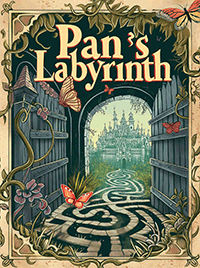Imaginationland & Other Worlds

There are maybe infinite worlds, existing alongside, above, below and all around each other. Some are more physical, others more spiritual, none are only one or the other.
The obvious place to start is astral projection, which is the ability for consciousness to move focus from the physical body into a spirit body, which can then fly around exploring various other mostly-3D worlds that appear to exist in layers, with the more heavenly realms higher up and more difficult to reach. The experience can be more real with greater clarity and definition than the physical world, leaving no room for doubt.
Astral projection is something that I aspire to master but at this stage I’m still a beginner. I project around once or twice a month but I’m usually on autopilot and not fully conscious, nor can I initiate it on demand. Fortunately, the internet is filled with a wealth of information about astral projection, and there are numerous books available. I don’t feel I can add to that at this time, and I don’t want to betray my readers or myself by repeating others people’s words as my own.
But there is a particular spirit world that I have a great deal of personal experience with, and it’s one that has not been written about before as far as I know: Imaginationland.
Imaginationland is my name for my personal discovery of shared space accessible from the mind. It’s non-physical but I see it in my mind’s eye as if it’s a landscape in which different ideas hold different territories within the landscape. Incidentally it’s similar to the concept of a 3D latent space in machine learning.
Knowledge within Imaginationland is territory. To know something and think of it is to go there in Imaginationland. Likewise to go somewhere new in Imaginationland will give you new knowledge. But to gain access to the new knowledge you must be allowed in by the gatekeeper.
To gain access you can pay for it with spiritual energy, trade for something, you can be initiated into that knowledge like it’s a club (if they want you), or you can fight the gatekeeper. The gatekeeper is another person, spirit or group that currently owns that knowledge-territory.
Once I figured this out, I spent years fighting in Imaginationland trying to discover all the secrets of the universe. Eventually I had a vast territory of what I now recognize to be mostly useless beliefs and philosophical theories, although at the time I thought they were gems. Most usefully, what I did learn are countless defensive and offensive strategies.
The most useful knowledge is that which requires initiation and cannot be bought or defeated because it’s held, shared and defended by a large community of members. There is also value in knowledge that is not widely distributed and held in secret by an exclusive club. This is common with knowledge that loses efficacy the more widely it’s known, such as military strategy.
This is not to say that all knowledge already exists within Imaginationland. New knowledge is invented all the time. Often though, human discoveries of knowledge are not novel inventions but a reduction in cost of entry for the knowledge.
Symbolic Spaces
It’s called “Imaginationland” for a reason. While the substance of Imaginationland is knowledge which is spirit, it’s not all spirit. That would be impossible to interact with.
The physical world is externally physical, but internally spiritual, i.e. we move physically but we think with ideas and feel emotions. In the same way Imaginationland is externally spiritual, but internally physical.
To visualize this, space in Imaginationland is non-physical, you are always in the location of the idea you are thinking about. To think of something else is to move to that place. The distance between locations is the relationship between those ideas. But then within each territory are closed mini-reality pockets of 3D space that are local to the idea that you are in the territory of.
In the physical world you feel something that is happening in spirit, that’s what a feeling is. For example, if someone is attacking you or you have lost something in spirit, you feel emotional pain in some part of your physical body. In Imaginationland this is backwards. Within a mini-reality pocket of 3D space, physical things represent what is happening symbolically. These symbolic spaces are malleable by your intention.
Many people when experiencing a symbolic space (and this includes in dreams) dismiss the real-ness of it and demote it’s importance because they believe they are experiencing an interpretation or translation of something that their mind cannot directly experience. This is not true, and is another one of those suppressive beliefs. The content of symbolic space is symbolic not because it’s a translation but because this is just how spirits worlds look. 3D physical bodies communicate through spirit, and spirit bodies communicate through 3D physical scenes. It’s not an imaginary subjective interpretation of something intangible— what you’re seeing is real.
Your communication with the gatekeeper happens in one of these malleable symbolic spaces that are mini-reality pockets. You’ll experience this in the physical world as something like a daydream. But you can be aware or unaware of these symbolic mini-reality pockets, depending on if this part of your self is managed by your conscious self or unconscious self.
A battle fought in Imaginationland is going to come to you like that. If you’re unconscious of it you’ll experience a struggle but no visuals, then if you win the won knowledge will come to you suddenly. If you’re conscious of it you’ll have a daydream about fighting something, solving some puzzle, overcoming some challenge, or even just a conversation, and then if you get through the knowledge will instantly come to you.
Often this takes the form of a frequently-used trope: the Wizards’ Duel.
The Wizards’ Duel & The Labyrinth
A Wizards’ Duel is what an anything-goes battle within a symbolic space looks like. Whomever can manifest the most powerful physical symbol within the symbolic space, wins. Within the symbolic space you can manifest anything you can think of.
In the movies this is typically depicted as each wizard transforming into greater and greater entities: a snake, a wolf, a dragon, etc. That’s the general idea, but in practice it quickly becomes a battle of wits, hooks, tricks, and illusion.
The most well defended ideas have labyrinths with thousands of layers of challenges, puzzles and illusions. For some of these the idea itself, the initiation ritual to join, and the battle are all one thing: woven together into a labyrinth that slowly reveals its secrets as you pass it’s tests.
Others use the same mechanism but give nothing at all, only making it always look like you’re just around the corner, almost have them, with the intention to tire you out or keep you busy.
For useful and well-defended knowledge your only practical option is to prove yourself worthy in the sense that that club would want you as a member. Fighting labyrinths is a generally bad idea because they could be defended by gods or millions of beings. You wouldn’t try to raid a military base all by yourself, right? The same is true in Imaginationland.
However, there are unique spiritual items such as very specific beliefs, tools, ideas, strategies, etc. that are just held by one being somewhere and otherwise unknown. Sometimes they don’t even know what they have because they found it, stole it, won it somewhere, or inherited it. These you can win with a straight Wizards’ Battle. Most are junk, some are treasure.
Learn more at Sorcery.org

If you enjoyed this article, you’d like my book “Pan’s Labyrinth”.
Pan’s Labyrinth deftly blends fantasy and philosophy, crafting a thought-provoking narrative that lingers in the mind long after the final page is turned. It invites readers to question the nature of reality and explore the profound ideas woven throughout the story. Engaging and intellectually stimulating, this book promises a reading experience that is both entertaining and deeply meaningful.
